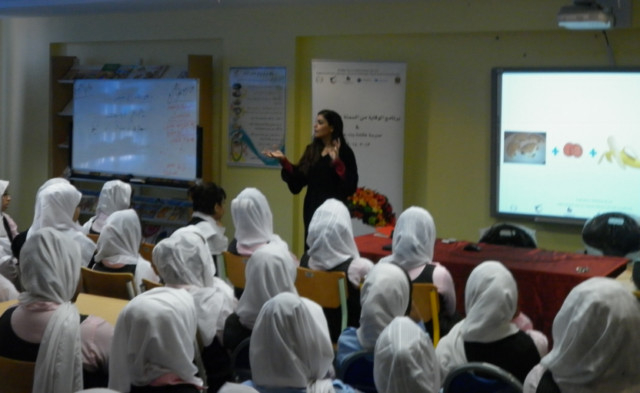
Abu Dhabi: With nearly 40 per cent of UAE students in the 12 to 15 years age group overweight, according to a global school health survey conducted in 2010, the General Women’s Union (GWU) continued its anti-obesity programme.
Additionally, almost 34 million people have type two diabetes in the Middle East and North Africa (Mena) region, with the UAE ranked 11th worldwide with 19 per cent suffering type two diabetes, according to a recent survey in 2012.
In efforts to increase physical activities and educate children, as well as parents, about proper nutrition methods, the GWU has launched the second phase of its programme to tackle and prevent obesity among children in the capital yesterday.
The GWU, in collaboration with the United Nations Children’s Fund (Unicef) have started phase two of its programme, after successfully reaching a total of eight schools and around 3,000 students, 620 duty bearers and 8 nurses in the first phase of the obesity prevention programme.
Under the patronage of Her Highness Shaikha Fatima Bint Mubarak, Chairperson of the UAE GWU and the Family Development Foundation, the obesity prevention programme targeted about eight government schools, four in Abu Dhabi and four in Dubai.
“By the end of this phase we will reach around 1,500 students and 200 staff members,” Razan Sahuri, nutrition consultant at Unicef, told Gulf News. “We are trying to provide more awareness about healthy eating and promote physical activity through our obesity prevention project and through taking part in various activities, workshops, seminars and exhibitions.
“Unicef continuously works alongside its partners to advocate for a healthier lifestyle to reduce the prevalence of obesity and reduce the diseases associated with it.”
In cooperation with the Abu Dhabi Education Council (Adec) and the Abu Dhabi Health Services Company (Seha), information about the student’s weight, height and body fat percentage have been calculated to help introduce active lifestyles and nutrition methods.
“Reducing obesity level in the UAE will help in fighting non-communicable diseases such as cardiovascular diseases, cancer, diabetes and respiratory diseases as well as improving health status of children in the UAE,” said Dr. Ebrahim Al Ziq, representative of Unicef to the Gulf Arab countries.
“The programme had successfully completed the first phase in around eight schools in both Abu Dhabi and Dubai emirates and we are looking forward to implement it at other government schools in the emirates of Ajman and Umm Al Quwain,” he said.
Al Ziq also stressed the importance of promoting a healthy educational environment at schools, which can assist in clearly explaining the concept of what an active lifestyle is.
“Media has a very significant role in positively or negatively affecting the choices of our children, whether the type of food they eat or physical exercise they practice,” Al Ziq said. “Therefore, advertising on food and beverages with high percentages of sugar, salt and saturated fat should be reduced and watched closely. Additionally, more awareness campaigns should be conducted to combat obesity.”
“Free body mass testing and medical counseling will be provided for both parents and children so they can effectively contribute to the launch of the second phase of the programme during the current academic year,” said Dr. Dalia Haroun, programmes consultant for Unicef Gulf Area Office.












